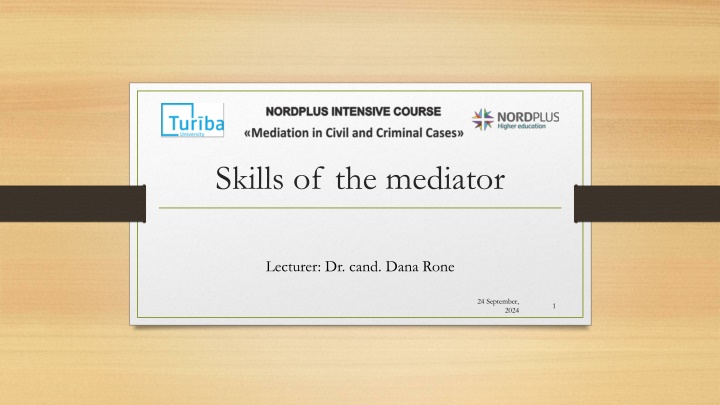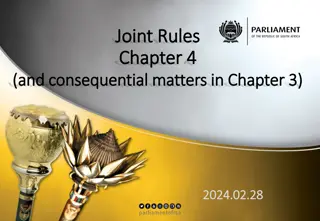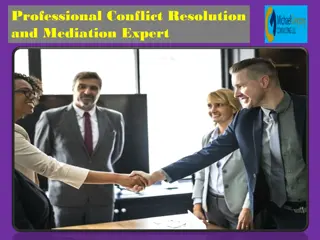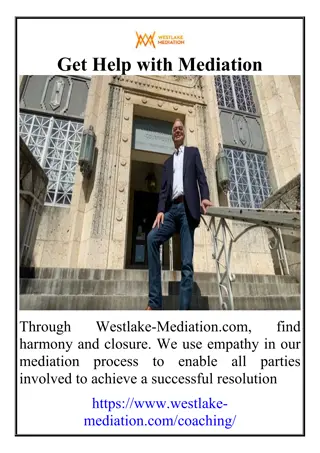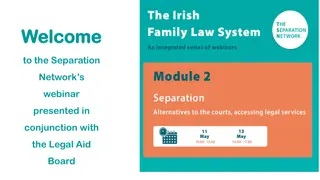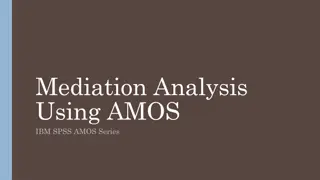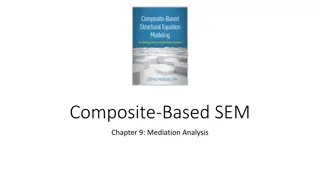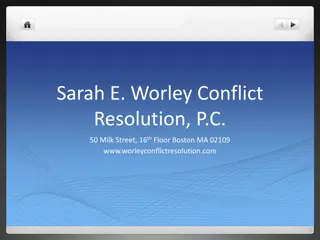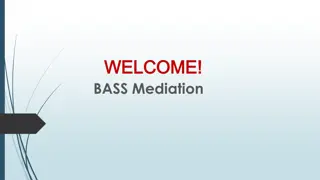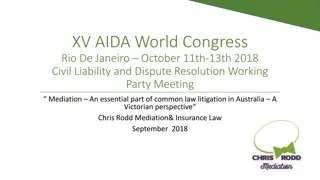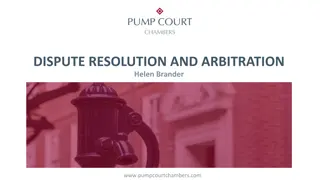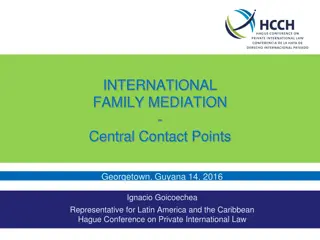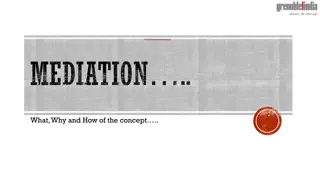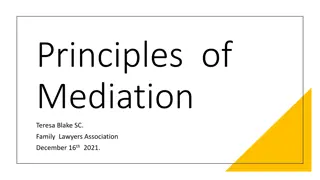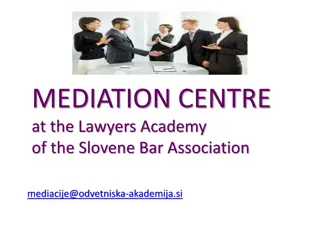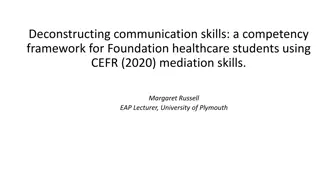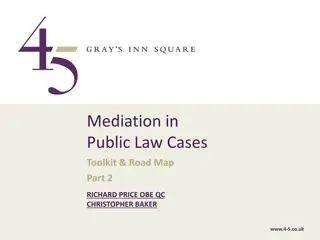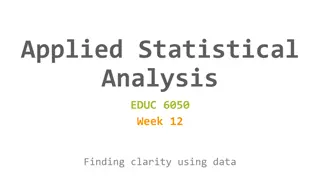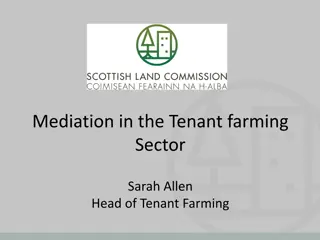Effective Strategies for Setting the Stage in Mediation Sessions
Dr. cand. Dana Rone shares valuable insights on preparing the mediation room for a safe, peaceful, and stress-free environment. Topics include room transformation, table shapes, and creating the right atmosphere for different types of disputes. Practical tips on ensuring comfort and facilitating communication between parties are highlighted.
Uploaded on Sep 24, 2024 | 1 Views
Download Presentation

Please find below an Image/Link to download the presentation.
The content on the website is provided AS IS for your information and personal use only. It may not be sold, licensed, or shared on other websites without obtaining consent from the author.If you encounter any issues during the download, it is possible that the publisher has removed the file from their server.
You are allowed to download the files provided on this website for personal or commercial use, subject to the condition that they are used lawfully. All files are the property of their respective owners.
The content on the website is provided AS IS for your information and personal use only. It may not be sold, licensed, or shared on other websites without obtaining consent from the author.
E N D
Presentation Transcript
Skills of the mediator Lecturer: Dr. cand. Dana Rone 24 September, 1 2024
Getting prepared for mediation session. Setting the room Safe and cozy No intrusion from third persons, disturbance by others and moral attacks by either a mediator or by the opponent Relaxed, peaceful, no unnecessary stress Transformation of the room 24 September, 2024 2
Getting prepared for mediation session. Setting the room How would I feel if I would enter this room for the first time to proceed with mediation? A mediation session is not a process of psychotherapy A mediation session is an effective working round The environment fit for writing, checking the documents, especially in business mediation 24 September, 2024 3
Getting prepared for mediation session. Setting the room With or without a table? In a circle or no? Depends on type of dispute in a family / business / other mediation Practical or emotional? Safety / barrier created by presence of a table 24 September, 2024 4
Shape of the table A grounded belief - a round shaped table is the most suitable for settlement of disputes No statistics available about proportion of settlement agreements concluded at the round shaped, and other shaped tables Other shapes are fine Eye contact Comfortable distance 24 September, 2024 5
Shape of the table. Square 1 Mediator Party 1 Party 2 24 September, 2024 6
Shape of the table. Square 2 Mediator Party 1 Party 2 24 September, 2024 7
Shape of the table. Rectangular 1 Mediator Party 1 Party 2 (Aggressive) 24 September, 2024 8
Shape of the table. Rectangular 2 Mediator Party 1 Party 2 24 September, 2024 9
More and less comfortable seats Are all seats in the room equally comfortable? Where would you like to sit to feel safe? Where should a mediator sit? And the parties? Who chooses seats? What do the mediator see from his/her seat? What do the parties see from their seats? 24 September, 2024 10
Chairs Stable Comfortable or at least normal How many chairs in the mediation room? Sit physically in each chair of the parties and feel the place 24 September, 2024 11
Place Light or dark Noisy or quite Ascetic or posh 24 September, 2024 12
Supplementary materials Everything for effective work A paper, pen, blackboard, flipchart desk, whiteboard markers, highlighters, post-it stickers, etc. Notes and tools Visual materials Water, coffee, tea, snacks, etc. 24 September, 2024 13
Form of the questions Questions = means of communication Questions shall be used strategically, to structure and control conversation in accordance with the questioning technique Ask: 1. To motivate the parties to talk, 2. To tell, 3. To generate ideas meanwhile staying in the borders of the main subject of the dispute 24 September, 2024 14
Open questions An opposite to the closed questions Open questions invites and motivates the parties to tell more, to disclose and share their thoughts, feelings and intentions Could you please tell me more about ? What need to happen so you could gain back the trust to your business partner? Have you thought about possible solutions here? 24 September, 2024 15
Closed questions Examines, confirms, precises and closes the story told Closed questions aren t worse than open questions Closed and narrow questions do not motivate to continue talking (if only the party to the mediation is not as personality a pure blabbermouth) When you signed a contract? What color was that car? Did you submit a claim to the court or no? 24 September, 2024 16
Questions In the beginning of the process importand to learn as much as information as possible In other phases closed questions, to precise facts, to discipline the party in mediation who is too vague in the answers, evades answering or in too phylosofical mood 24 September, 2024 17
Why question sounds aggressive Tone of voice, attitude, mood, body language, intonation In understanding and non-judging way: Could you please tell me more why did not decide to visit your child once a year? In nasty, evaluative tone technically correct question: Could you please tell me more about this case? 24 September, 2024 18
Questions In the aspect of asking questions the work of mediator is similar to the work of journalist A good question can help the respondent to think about themes, about which the person haven t even thought before in the heat of the dispute For the mediator this task is very heavy especially if the subject of the dispute is complicated and connected with a list of complicated facts, which the mediator must learn in a limited period of time 24 September, 2024 19
Stay with the subject If the party speaks about subjet A, don t ask about B However there are exceptions 24 September, 2024 20
Notice the subject Notice and hear the moment, when the party repeats some word, phrase or subject 2, 3 or even 4 times Sending of strong signal she/he wants to talk about this more and wants to be helped to be disclosed I noticed that today you mentioned twice [the subject X]. Would you like to tell me more about this and what [the subject X] means to you? The purpose of such question is: 1. to help to the party to realise the posed question; and 2. to discover the meaning of it; and 3. to help to the opponent to hear wishes, feelings and aims of the first party. 24 September, 2024 21
Active listening Although the sound locator of the human ears are placed externally, and technically it is possibly to hear and listen even not looking at the source of sound the to the speaker or being rather distant, nevertheless it is important for the mediation process to demonstrate to the parties in a reasonable amount that they are really heard not only in the audial level of sounds, but also in the level of understanding 24 September, 2024 22
Active listening The purpose of the active listening to correctly perceive inner condition, needs, feelings and wishes of the partner in conversation, which mostly are expressed in a rather hidden and indirect way These messages must be paraphrased to share with the partner of conversation his world of feelings Active listening = letting the partner in conversation talk, showing gestures, facial expression and body language or mutual understanding, at the same time remembering and respecting the feelings of the opposing party in mediation 24 September, 2024 23
Reflecting in mediation In a reasonable quantity and frequency Take into account type of the dispute and personalities of the parties If the tempo of mediation is slower the mediator can manage to reflect almost after every second sentence 24 September, 2024 24
Reflecting in mediation Statement: I want to have peace and silence when I am home. Reflection: So you say that peaceful atmosphere is importand for you. Statement: I don t want to continue this agreement because I am constantly cheated. Reflection: Do I understand you right that you have lost trust into your business partner? 24 September, 2024 25
Reaction of the party to the reflection 1. The party positively approves that the mediator has understood correctly what was told by the party. 2. The party negatively responds by saying that that is not what was just told. In this case the mediator should try to clarify the contents of information by asking that party to explain a little more for better understanding of the story. 3. Perplexity showed by the both parties. This is typical to fast speed, precise, business-like mediation processes, when it is almost impossible for the mediator to find the right time for reflection of said information and posed emotions. 24 September, 2024 26
Reflection Not only to contents, but also to emotions I see that you are very sad now. You have a lot of anger about this matter. Naming emotions can help the parties to understand better the situation 24 September, 2024 27
Joint and separate sessions Various opinions If the mediation process is begun with the joint meeting, then the parties strengthen their confidence into neutrality of mediator and equal attitude towards both parties The introductory session is especially importand because the first impression about the mediator and his abilities to conduct the process of mediation is established. 24 September, 2024 28
Joint and separate sessions When the mediation process is opened by separate sessions, there is much higher probability that both parties will disclose without delay to the mediator their wishes, aims and interests The risk of separate sessions is connected with the fact that the opponent can feel and demonstrate distrust into the mediator and start questioning his neutrality, not knowing what issues the mediator has discussed with the opponent in the absence of the other party 24 September, 2024 29
Joint and separate sessions Joint and separate sessions supplement to each other, not exclude Application of just and only separate session could be useful when both or any of the parties whould have proposed a clear precondition that it s participation in mediation is only realistic when both parties will never sit in the same room. Individual sessions, called also shuttle mediation is organized by the mediator in equal amount and length with both parties When conducting separate sessions the mediator must make sure that he is able to maintain his impartiality and neutrality 24 September, 2024 30
Bibliography: 1. Rolands Hofmans, Dorisa B. Rotfi ere, Art rs Trosens (ed.). Medi cija. Medi cijas pamati teorij un praks . Riga: Tiesu namu a ent ra, 2007. 2. Freddie Strasser, Paul Randolph. Mediation. A Psychological Insight into Conflict Resolutution. London, New York: Continuum. 2004. 3. Franscesco Pesce. Dana Rone (eds.). Mediation to Foster European Wide Settlement of Disputes. Arricia: Aracne. 2016. 4. Hans Boserup. Mediation. Six Ways in Seven Days. Copenhagen: DJ F Publishing. 2007. 24 September, 2024 31
Thank you! dana.rone@latnet.lv 24 September, 2024 32
